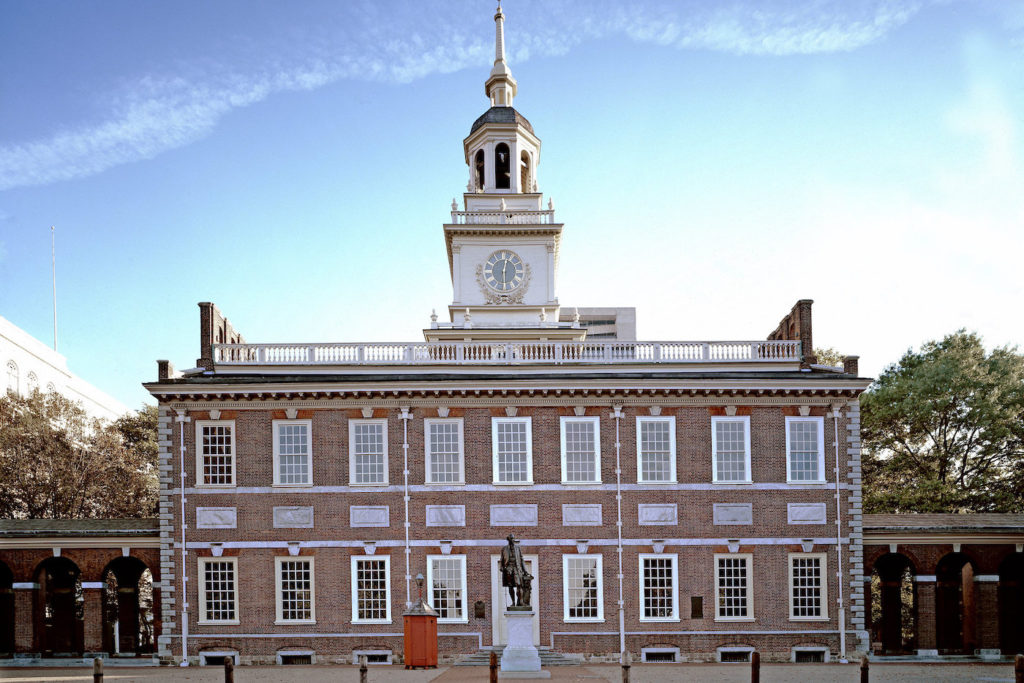Notre Dame professor Phillip Muñoz’s “natural rights” account of religious freedom generates prescriptions that will be satisfying to nobody—not even, it seems, to himself. The minimalist First Amendment defended in Muñoz’s Religious Liberty and the American Founding (2022), would forbid governments to act like or delegate power to churches or to interfere with “worship as such.” No meddling with the Mass “as such.” Beyond those strictures, governments would be constitutionally free to fund and favor religion, or to restrict and discriminate against religion. The Christian baker who objects to celebrating a same-sex wedding would find no protection in Muñoz’s First Amendment. Indeed, the Constitution would not even protect the Catholic Church from liability under a general antidiscrimination law for its male-only priesthood.
Hardly anyone will find these outcomes attractive, and Muñoz himself seems not especially happy with them either. Muñoz is not at all hostile to religion or religious freedom, and his interpretation allows legislatures to provide broader protections. He embraces the constitutional prescriptions because he believes a faithful interpretation of the Constitution compels them. Muñoz’s central premise is that the Constitution should be interpreted according to the “natural rights” logic that was prevalent in the Founding period; and he tries to follow this logic to its conclusions, come hell or high water. His unappealing prescriptions reflect a kind of courageous integrity.
Muñoz’s central premise is that the Constitution should be interpreted according to the “natural rights” logic that was prevalent in the Founding period; and he tries to follow this logic to its conclusions, come hell or high water.
I admire that integrity, but I also think it is profoundly misguided. In a short review, there is no way to do justice to the scope and intricacy of Muñoz’s account, so I will try only to explain in simplified terms where I think the central error lies. Before undertaking this mostly critical discussion, though, I must acknowledge (too summarily, alas) the book’s considerable virtues. Muñoz’s account exhibits impressive scholarship; it provides a lucid explanation of the Founders’ natural rights thinking; and the examination of constitutional texts is methodical and informative. The analysis of the legislative history of the Establishment Clause is as meticulous as any I have seen.
Start your day with Public Discourse
Sign up and get our daily essays sent straight to your inbox.These are notable accomplishments. And yet . . .
Religious Freedom As a (Narrow) Natural Right
Suppose a scholar were to show that the authors of an ancient legal document were deeply committed to, say, astrology. That would be an interesting historical fact, and it conceivably might shed light on the document, even if we now regard astrology as nonsense. But we may be skeptical if the scholar proceeds to argue that those authors misunderstood their own document in places because they misapplied astrological principles. And we will be more skeptical still if the scholar goes on to argue that we should resolve current controversies under the still authoritative document by extending the authors’ (spurious) astrological reasoning to the present, including to questions that they never considered.
This is basically what Muñoz does in this book, invoking not astrology but rather “natural rights.” He argues, for example, that although the Founding generation saw no constitutional problem in legislative prayer, they were mistaken; unbeknownst to them, their own natural rights logic condemns the practice. And he spends the last third of the book explaining what “the natural rights construction” would dictate with respect to a host of current constitutional controversies: this is where he reaches the counterintuitive prescriptions noted above.
To some readers, of course, my analogy will seem unfair, even absurd. Astrology and “natural rights” are hardly comparable.
Or are they?
As Muñoz explains, “natural rights” were thought to be derived from—or, rather, reserved in—social compacts whereby individuals agreed to exchange the unregulated but vulnerable freedom of the pre-political “state of nature” for civil society and government. A right to religious freedom was among these reserved “natural rights.” Muñoz laments that hardly anyone today thinks in “natural rights” terms; that is because, he suggests, we have lost confidence in the power of reason to lead us to sound conclusions in matters of governance and justice. Well, that may be one reason why “natural rights” thinking has gone out of fashion. But another is that such reasoning seems to lack cogency. It is like trying to answer practical legal questions by interpreting a fairy tale.
Just as a matter of history, after all, the story of a pre-political state of nature culminating in universally agreed on social compacts seems to be a flagrant fiction. And although fictions have their uses, they are also inherently squishy. The social contract is a made-up thing; consequently, I can make up a social contract that contains or excludes whatever terms I want, and so can you. So could Thomas Hobbes, and John Locke, and Jean-Jacques Rousseau—and Thomas Jefferson.
Muñoz himself emphasizes that although natural rights thinking was pervasive in the Founding generation, thinkers of the period differed radically in their understandings of what religious freedom entailed. Given the fictional nature and the consequent malleability of the social contract, this is just what you would expect. So why would anyone suppose that any genuine disagreement about law or government could be persuasively settled by hypothesizing such a contract? And why would anyone feel compelled to hold to a profoundly unattractive version of religious freedom just because that is what some rendering of the fictional social contract dictates? Why not just imagine a more friendly or sensible contract?
The social contract is a made-up thing; consequently, I can make up a social contract that contains or excludes whatever terms I want, and so can you.
“Natural Rights” (Il)logic
Muñoz believes, however, that there is a kind of natural-rights logic that leads to his minimalist version of religious freedom. Here is the logic, as I understand it: Some rights that would exist in a state of nature are inherently inalienable, because it would simply be impossible for contracting parties to relinquish them. So any social contract would necessarily recognize these particular, impossible-to-relinquish rights. And religious freedom—albeit in an exceedingly narrow conception—is, or was, or would be, one such inalienable right.
And why would it be impossible for hypothetical contracting parties to relinquish this right of religious freedom? Citing seminal statements by Jefferson and Madison, Muñoz suggests that all of us necessarily believe, and cannot help believing, whatever the evidence seems to us to support. Even if you wanted to, therefore, you could not transfer power over your beliefs to government. In that sense, your aboriginal right to believe whatever you actually do believe is literally inalienable. Because this right could not be ceded away in any government-creating social contract, government accordingly can have no jurisdiction in the realm of religious belief– a realm that Muñoz quietly extends to worship.
Conversely, according to Muñoz, you could grant to government the power to regulate conduct– even religiously-motivated conduct. In a pre-political situation you might enjoy a right to conduct yourself according to your religious convictions, but that right is not inalienable. So the natural-rights logic of religious freedom provides no basis for concluding that hypothetical contractors would reserve a free exercise right covering religious conduct.
There is much that might be said about this argument. But even within the artificial confines of a social-contract thought experiment, the argument, if I have understood it correctly, seems doubly infirm. It does not support even Muñoz’s narrow categorical right covering “worship as such.” Suppose we stipulate that people have no control over their religious beliefs (a contestable point, actually), and hence could not relinquish a right to believe as they see fit. The right would cover beliefs, but it is not clear why this right would extend to worship. Governments cannot dictate what people believe in their minds and hearts, let us say; but governments surely can regulate—and often have regulated—how people worship.
On the other hand, even if a broader religious freedom right extending to conduct would not meet the impossibility-of-relinquishment requirement for inalienability, contracting parties who placed great value on religion might nonetheless choose to protect their ability not just to worship but also to live in accordance with their religious beliefs—even if such protection could not be absolute. This is not merely an abstract possibility: Muñoz explains that proponents of an “expansive liberalism” version of natural rights (including Madison) did hold that “religion itself, not just religious worship, lies beyond the legitimate jurisdiction of government.” Given the fictional nature of the social contract, who can say they were wrong?
Natural Rights and Constitutional Interpretation
In sum, the logic of natural rights need not leave us with only Muñoz’s freedom to worship. For argument’s sake, though, let us stipulate that Muñoz is right: a natural rights approach would support a narrow categorical right covering only religious worship. Even so, and even if we agree on a strict “original meaning” approach to constitutional interpretation, what is the warrant for imposing this narrow conception on the Constitution? Why couldn’t the Framers have constitutionalized more than, or less than, this meager right?
Muñoz addresses the question by trying to show that the original public meaning of the Free Exercise Clause tracked his natural rights interpretation. In doing so, he vigorously criticizes scholars like Michael McConnell and jurists like Justice Samuel Alito who have interpreted the provision more broadly to support “free exercise exemptions” or accommodations. Muñoz’s discussion is detailed and illuminating. But does he show that the broader accommodationist interpretation is mistaken? I don’t think so.
In a short review, once again, I cannot address the finer points of Muñoz’s argumentation. But consider three main sites of skirmish. First, state constitutions. McConnell and Muñoz agree that state constitutions are a valuable source for understanding Founding-era thinking. And McConnell (and Justice Alito) note that several state constitutions contained “public peace” provisions declaring that the practice of religion could be restricted only if “repugnant to the peace or safety of the State” (as the Georgia constitution put it). Such qualifications would seem to be limitations on otherwise protected religious conduct, not mere worship. Muñoz responds that several state constitutions did not contain any such qualifications. The language of these constitutions looks more categorical, and since categorical protection for religious conduct would obviously be impractical, Muñoz infers that the right must have been narrower in scope.
But this inference seems frail. Muñoz’s response does not really account for the state constitutions that did explicitly contain “public peace” limitations. And he himself repeatedly insists that the Founding generation understood that rights inherently contain their own limitations. So even for the constitutions with more categorical-looking language, it is equally plausible to suppose that these constitutions simply took the “public peace” limitation for granted and thus left it implicit.
Second, consider the legislative history of the Free Exercise Clause itself. Some of the earlier versions or proposals expressly used the term “worship,” as did Madison’s own initial version. But the final version—the one that was actually forwarded to the states, ratified, and placed in the Constitution—dropped the term “worship” and referred instead to “the free exercise thereof”—i.e., of religion. The “exercise” of religion, it would seem, is not limited to worship. In persuasively arguing against “no preference” interpretations of the Establishment Clause, Muñoz notes that some earlier versions were worded in “no preference” terms but that the final version deleted this language; and he infers that the Framers considered but rejected the “no preference” idea. The same logic would seem to apply to his own claim that the Free Exercise Clause covered only worship, not conduct or “exercise.” In other words, why is the “no preference” excision indicative of the Framers’ intent, but not the preference for the more expansive “exercise” over the more minimalist “worship”?
Third, Muñoz makes much of the fact that in drafting what became the Second Amendment, the framers considered including a specific provision exempting religious pacifists from military service: such an exemption was approved in the House of Representatives but deleted in the Senate. Muñoz thinks that Congress’s deliberation of this pacifist exemption means that the Framers didn’t build free exercise exemptions into the First Amendment. If the First Amendment already contemplated free exercise exemptions, Muñoz argues, such a provision would have been superfluous. Moreover, nobody in Congress even noted a connection between the Second Amendment’s proposed exemption for religious pacifists and the Free Exercise Clause.
But it is difficult to draw any strong inferences from these facts. For one thing, we don’t know whether anyone in Congress noticed a possible connection between the amendments; the pacifist exemption was deleted in the Senate, where debates were not recorded. So who knows? The Senate might have deleted the provision because the senators thought it superfluous.
Less speculatively, the Religion Clauses, like the Bill of Rights in general, were framed and advanced by people (like Madison), as Muñoz explains, who believed them unnecessary but were trying to appease critics and fend off calls for a second constitutional convention. So discussion of the ostensibly unnecessary provisions was mostly complacent and exceedingly brief; few legislators bothered to speak at all. Consequently, very little can be inferred from what was said or, a fortiori, from what was not said.
Given congressional complacency and the paucity of direct evidence, it may be that the historical record does not conclusively support an interpretation mandating free exercise exemptions; indeed, McConnell never claimed otherwise. But in contending that the record establishes the opposite conclusion—namely, that the framers rejected such a right—Muñoz goes beyond what the evidence warrants.
If the Father of the Constitution did not restrict himself to a social contract approach, why should we?
The Framers’ Achievement
Nothing in the preceding discussion should be taken as disparaging the Framers and their achievement, or even their natural rights vocabulary. Every generation needs to address issues of governance and law, and hence will look for some framework or vocabulary for thinking about such matters. By the late eighteenth century, the more Aristotelian and Thomistic approaches of earlier centuries had been discarded as unduly “scholastic”; and the purely Christian or biblical approach had become unacceptably “sectarian” in Enlightened circles. A “natural rights” approach may have seemed like an eligible replacement. Its very malleability made it useful for expressing conclusions defensible on less fictional grounds.
Moreover, although the Founders thought in “natural rights” terms, that approach hardly exhausted their intellectual repertoire. Madison’s argument for religious freedom in his seminal Memorial and Remonstrance, for example, contained explicit social contract language, to be sure; but it also contained much else that was not dependent on the fictions of a state of nature and a social contract. If the Father of the Constitution did not restrict himself to a social contract approach, why should we?
The enduring implication of calling religious freedom a “natural right,” as Muñoz explains, was that religious freedom is an inherent human right that is not merely a concession of government. We can surely applaud that conclusion without embracing, or confining ourselves to, the specific “state of nature/social contract” thinking that the Founders sometimes used to express that idea.














